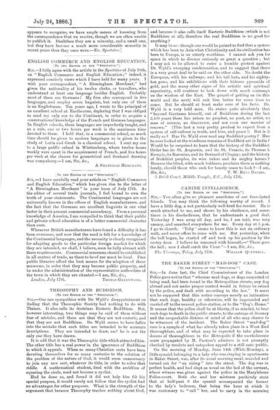THEOSOPHY AND BUDDHISM.
IT° THE EDITOR OF THE " SPECTATOR.") SIR,—One can sympathise with Dr. Wyld's disappointment on finding that the Theosophic Society had nothing to do with Theism. It also calls its doctrines Esoteric Buddhism. But, however interesting, two things may be said of them without fear of mistake, and these are that they are not esoteric, and that they are not Buddhism. Dr. Wyld seems to have fallen into the mistake that such titles are intended to be accurate descriptions. They are intended to draw, and he is not the only one they have drawn.
It is odd that it was the Theosophic title which attracted him. The other title has a real power in the ignorance of Buddhism to which it appeals. When so many Christian sects have been devoting themselves for so many centuries to the solution of the problem of the nature of God, it would seem unnecessary to join any new sect, whatever its title, in order to solve that riddle. A mathematical strident, fired with the ambition of squaring the circle, need not become a cyclist.
Had he done so, and found it did not help him fo'r his special purpose, it would surely not follow that the cyclist had no advantages for other purposes. What is the strength of the argument that because Theosophy teaches nothing about God, and because it also calls itself Esoteric Buddhism (which is not Buddhism at all), therefore the real Buddhism is no good for anything ?
It may be so : though one would be pained to find that a system which has been to Asia what Christianity and its civilisation has been to Europe, is so utterly worthless. I cannot ask you for space in which to discuss seriously so great a question ; but I may ask to be allowed to enter a humble protest against Dr. Wyld's sweeping condemnation, and to suggest that there is a very great deal to be said on the other side. No doubt the European, with his railways, and his tall hats, and his eighty. ton guns, and his exhibitions with their hideous pyramids of gold, and the many other signs of his artistic and spiritual superiority, will continue to look down with much contempt on the wisdom of the East. The gospel of getting on (in this world and the next) will suit him better for some time to come. But he should at least make sure of his facts. Dr. Wyld is a very bold man. He states quite absolutely that " beyond Gautama himself, out of Buddhism during the last 2,100 years there has arisen no prophet, no poet, no artist, no man of science, no discoverer, and not even one warrior of renown." (This last a very pretty produot to expect from a system of self-culture in truth, and love, and peace !) But is it really so ? Has Dr. Wyld ever read any Buddhist poetry ? Has he ever looked at the wondrous remains of Buddhist art in India ? Would he be surprised to learn that the history of the Buddhist Order has its St. Augustin, and its St. Francis, its Thomas is Kempis, its Baronies, and its Bernard of Clugny ; and the history of Buddhist peoples, its wise rulers and its mighty heroes ? Because the blind, with much boldness, proclaim there is nothing lovely, should those who seek for beauty cease to look P—I am,


































 Previous page
Previous page